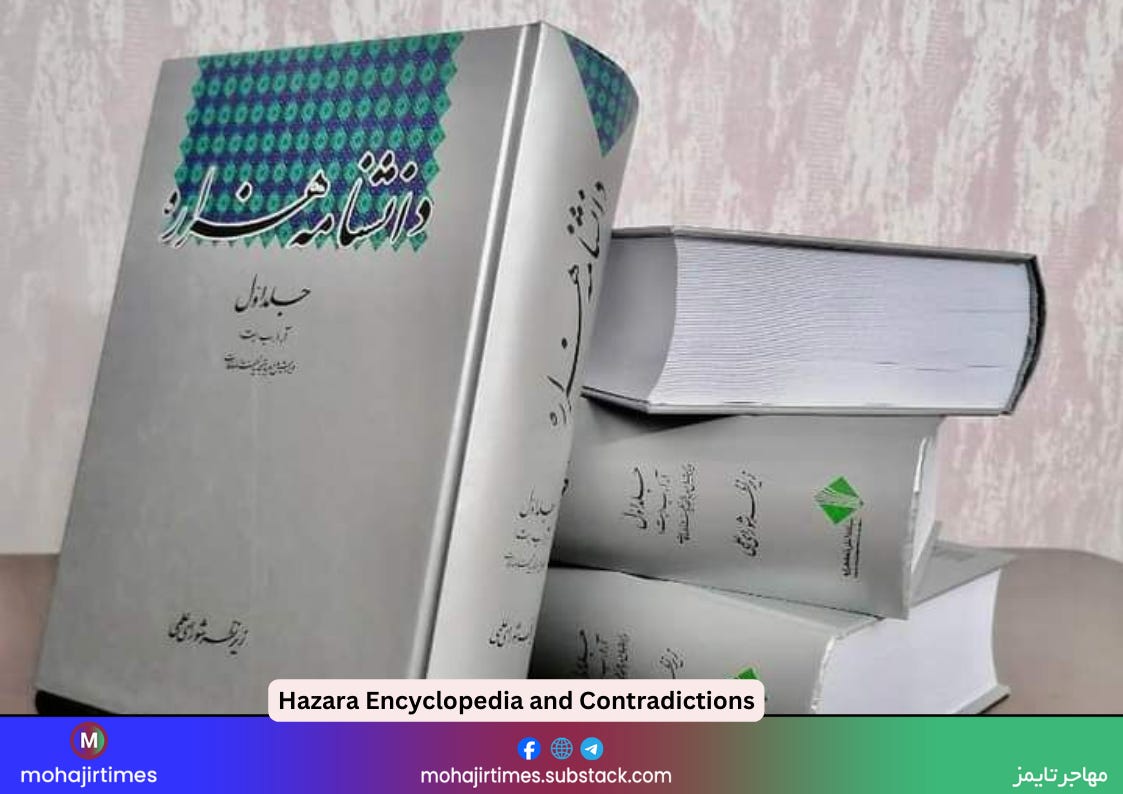Hazara Encyclopedia and Contradictions
I have never seen a Hazara without pain and history from east to west! Every Hazara has its own pain and history in its own way
These days, if we go to the virtual space, Facebook and Telegram, we will encounter many criticisms, agreements, and sometimes oppositions and suggestions about the Hazara Encyclopedia. An encyclopedia that smells of historical, cultural, and educational events and whatever is discussed about the history of a people and a generation. This expensive and enormous work is a source of pride for all those who write and substantiate a generation's ancient and contemporary history as it was.
About the Hazara Encyclopedia, these days, many writers and critics have written, criticized, and sometimes offered suggestions to improve the work, method, and research of this great work. These criticisms have sometimes been met with open-mindedness by the people involved in Encyclopedia, and sometimes these writings have caused the loved ones to feel hurt. Therefore, we can all be thankful for the continuous efforts and hard work of those dear ones who have had and have historical-scientific-cultural concerns about the history of a burned and discriminated generation.
However, the fact that our good scientists, writers, and penmen have written or will write in this regard either in a defensive position or in a correction and proposal position, and in the hope that this historical-scientific-cultural source will be a heavier, more comprehensive and more refined generation and also based on scientific and historical methodologies, and well-reasoned and standardized research should be presented to the communities and generations. And yet, let us pen less and be a place of patience.
Although I haven't read Hazara's encyclopedia yet, making a quantitative and qualitative opinion about a book that may be more than a thousand pages voluminous and thick is impossible. Whatever our friends read, they provided criticisms, suggestions, and defenses, and I have read and used the same lines from time to time. So, I have not read the book and have no opinion or idea about its in-text methods, sources, entries, and references.
I just want to elaborate on what has been explained in Mr. Amanullah Fasihi's recent writing. And referring to it, I would like to present a short excerpt to my friends. Fasihi wrote that text describing the current situation from the time of the Hazara Encyclopedia, which he studied deeply and carefully. It was really a comprehensive text based on the contents of the Hazara Encyclopedia book. In the same way, it has included and presented some reliable references and research structures for ways to improve matters.
Mr. Fasihi has discussed several things in his text, among which he said that some people were highlighted more and in a large way, and also, some people were erased and marginalized from the entries and selections in the Hazara Encyclopedia glossaries. However, some of the staff and members of Hazara Encyclopedia have reacted officially or unofficially in this matter.
Some of them contradictorily claim that some people, like Asad Buda, when we contacted him, “did not share his biographical information with us and strongly denied it, saying, I don't have a biography. “Wherever we searched, there was no biography of him.” I believe these are pure contradictions in a scientific-historical and research source structure. Thus, Such contradictions can require serious revisions in that structure.
I don't think that the methods of “Methodology” of encyclopedia writing are like this: If someone does not give their biography, it will be deleted from the selections and entries, footnotes, articles, and references and thrown into the trash! So, what is the position of writers, researchers, and scientific observers with very high titles and degrees, and what are researchers' and writers' writing and research methods in a historical-scientific-cultural source? I don't think an Ismailia Hazara, Sunni Hazara, Shia Hazara, Baghlani Hazara, Kandahari Hazara, Eastern and Western Hazara, Dissident, and Religious Hazara have no place in the Hazara Encyclopedia. _ [Certainly and never like this.]
On the other hand, it never fits into anyone's imagination that the painful Hazara is the subject of discrimination, murder, terror, and organized genocides, so-called and seasonal, but does not have a biography and history, and even if others are “Distorting their History”. This is impossible, and it is a kind of contradicting one's own claim.
I have never seen a Hazara without pain and history from east to west! Every Hazara has its own pain and history in its own way. We have never seen Asad Buda without poetry and pain. Regardless of a person's intellectual tendencies, Asad Buda can be nothing but a painful and hurt Hazara. His pain in understanding the historical philosophy of a generation and his people is on the scale of Koh-i-Baba and the Hindu Kush mountains. Meanwhile, I would like to introduce a few sources of Asad Buda's poetry, fiction, essays, and biographies to dear friends as follows, and maybe they will be useful one day for research and references:
What Now, My Friend? - Essay by Asad Buda-Aicon Art New York- December, 2020
The Territory of Hope: Stories and Pictures from Little History-by Asad Buddha-Heidaron Publisher-pages 108-published in 2020
Asad Buda's Biography in International Cities of Refuge Network (ICORN)-Norway
Asad Buda's interview with Ms. Mia Herman is available in this Podcast.
Read more about him in this Article.
In the appeal, this point can also be considered as a suggestion that if the members and agents of the Hazara encyclopedia add a Digital Research training program to their work, it will not be without benefits and rewards. Because in the age of technological and digital transformations, historical documents and writings cannot always be dived traditionally on paper, but historical-cultural-scientific-research sources can be brought digitally to the platforms and stages.





